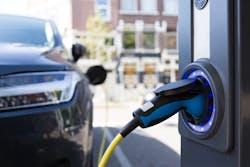USDOT Announces All 50 States, DC, and Puerto Rico Now Have Alternative Fuel Corridor Designations
The U.S. Department of Transportation's (USDOT) Federal Highway Administration (FHWA) announced on Wednesday the latest round of Alternative Fuel Corridor designations. Funding is directed to designated EV Alternative Fuel Corridors to serve as the backbone for the national electric vehicle charging network thanks to the National Electric Vehicle Infrastructure (NEVI) Formula Program established by the Infrastructure Investment and Jobs Act (IIJA).
“Whether you drive an electric sedan or an electric pickup truck, or any other EV that saves you money at the pump, you need to be able to count on finding chargers along the road as easily as a gas station,” said Pete Buttigieg, U.S. Transportation Secretary. “We’re pleased to announce the latest round of Alternative Fuel Corridor designations, which will accelerate deployment of an EV charging network that covers every part of our country.”
Alternative Fuel Corridor designations are now found in all 50 states, as well as Washington D.C. and Puerto Rico. The designations now cover 190,000 of the 222,000 miles of the National Highway System, which carries 55 percent of Vehicle Miles Travelled nationally. Coupled with funding from the IIJA and the private sector investment the law is spurring, Alternative Fuel Corridors are accelerating the availability of EV charging stations near national highways across the country.
“These Alternative Fuel Corridor designations will bring EV charging stations to more locations nationwide,” said Deputy Federal Highway Administrator Stephanie Pollack. “Having a national EV charging network is key to our transition to electric and alternative fuel vehicles, which in turn will save drivers money and reduce emissions that worsen climate change.”
Earlier this year, USDOT announced nearly $5 billion over five years under the NEVI Formula Program that would help states build out a national electric vehicle charging network, followed by proposed minimum standards to help ensure the national EV charging network is user-friendly, reliable, and accessible to all Americans. The proposed requirements will help states as they develop their EV deployment plans in concert with the Joint Office of Energy and Transportation, which was established by the Bipartisan Infrastructure Law and is providing direct technical assistance and support to states.
The sixth round of Alternative Fuel Corridors resulted in the addition of more new miles of corridors than any other round since the initiation of the program in 2016. FHWA announced a total of approximately 250 new designations nationwide based on nominations by state and local officials. Highways were evaluated on predetermined criteria as outlined in the Request for Nominations to be considered “corridor-ready” if they currently contain a sufficient number of alternative fueling facilities, or “corridor-pending” if not.
--------------------------------------
Source: USDOT
